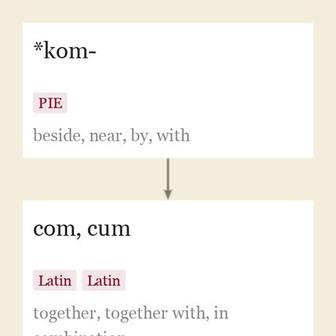| 词源 |
cousin n.early 13c., "a collateral blood relative more remote than a brother or sister" (mid-12c. as a surname), from Old French cosin "nephew; kinsman; cousin" (12c., Modern French cousin), from Latin consobrinus "cousin," originally "mother's sister's son," from assimilated form of com "with, together" (see com-) + sobrinus (earlier *sosrinos) "cousin on mother's side," from soror (genitive sororis) "sister" (see sister). Specific modern usage, "the son or daughter of an uncle or aunt," is attested by c. 1300, but throughout Middle English the word also was used of grandchildren, godchildren, etc. Extended sense of "closely related thing" is from late 14c. Italian cugino, Danish kusine, Polish kuzyn also are from French. German vetter is from Old High German fetiro "uncle," perhaps on the notion of "child of uncle." Words for cousin tend to drift to "nephew" on the notion of "father's nephew." Many IE languages (including Irish, Sanskrit, Slavic, and some of the Germanic tongues) have or had separate words for some or all of the eight possible "cousin" relationships, such as Latin, which along with consobrinus had consobrina "mother's sister's daughter," patruelis "father's brother's son," atruelis "mother's brother's son," amitinus "father's sister's son," etc. Old English distinguished fæderan sunu "father's brother's son," modrigan sunu "mother's sister's son," etc. Used familiarly as a term of address since early 15c., especially in Cornwall. Phrase kissing cousin is a Southern U.S. expression, 1940s, apparently denoting "those close enough to be kissed in salutation;" Kentish cousin (1796) is an old British term for "distant relative." For cousin german "first cousin" (early 14c.) see german (adj.). updated on February 19, 2020 |
